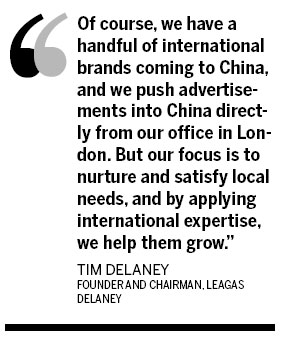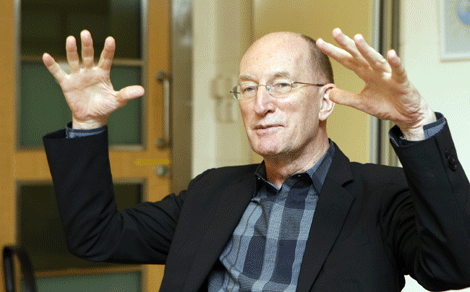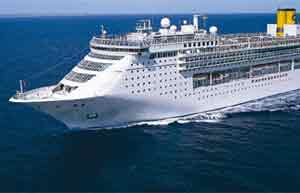The man who is the message
Updated: 2011-11-03 07:56
By He Wei (China Daily)
|
|||||||||
|
|
British advertising guru sees huge potential for domestic Chinese firms
SHANGHAI - It was a dark and rainy night in 2009 when Tim Delaney first landed at Shanghai's Pudong International Airport. But despite the meteorological adversity, the frequent traveler and seasoned advertiser immediately sensed the immense dynamism of the city and the enormous opportunities within it.
"I still have this picture in my mind of the first sight of the airport. It leaves me with this futuristic impression, and the way the buildings were lit up felt like the center of the earth," Delaney, 65, said.
The Briton and his business can certainly be counted as latecomers to the country's most energetic hub, but Delaney has faith that with his inspirational writing gifts, and his relatively small but talented team, he can engineer some changes to the country's flourishing advertising landscape.
Delaney founded his own advertising firm, Leagas Delaney, 31 years ago in London. With five offices across the globe, clients have included household names such as InterContinental Hotels, Timberland Boot Company and Adidas AG, among many others.
"Only 18 months ago, we originally came here for one of our clients to the Shanghai Auto Show. I was then completely taken by Shanghai, especially the environment of the city. That's when we decided to start here in China," Delaney said.
He returned the following year, when his firm helped launch a new InterContinental Hotel in Shanghai, and handled public relations activities for the Swedish government during the 2010 Shanghai World Expo. These assignments reconfirmed Delaney's commitment to the city and his China office was open by the end of the trade exhibition.
To Delaney, it was a fairly simple move from being introduced to the market, working in it for a couple of weeks and then actually settling down and enjoying the sense of growth. However, it was also a big step forward.
 |
"It is interesting to watch China progress so remarkably. During my stay in Shanghai, I saw a lot of young people in the streets enjoying themselves. That is part of the reason why I am so engaged with it. It just felt so energetic and upbeat, and our industry needs that."
Geniuses usually don't fit into a typical pattern of systematic education. Delaney started his career aged just 15 as a messenger boy for an advertising agency but was able to move on from delivering scripts to writing for a living.
"To be honest, I don't have an interesting educational background, but I do have good writing skills even though I went to a bad school," Delaney chuckled. "Maybe my parents were intelligent enough that I inherited the ability to progress but not through the education system."
After being a senior copywriter at BBDO, the industry tycoon Omnicom-owned agency, he became creative director at 27 and managing director at 31. During his time there, he helped to introduce Sony to UK consumers.
"People don't get to choose their careers. They pick us. But the good thing is, I have real passion, and I am really good at it," Delaney said.
Maybe his adaptability has become the source from where his inspiration for words derive. One of the best pieces Delaney created was for Patek Philippe, a high-end luxury watch.
The one thing about creative thinking is to demolish stereotypes. The agency did not follow traditional watch advertising rules - namely, sign up a celebrity, show a really huge watch and slap a logo in the right hand corner.
"One of the smartest things I have ever done is grab the research as I ran from our office there. 'Why do you watch-makers only talk about famous owners in the past? Why don't you talk about us, the new owners?' asked potential American luxury watch owners," he said.
Out of that comment came the Begin Your Own Tradition campaign. With a father and son shots and the line, "You never actually own a Patek Philippe. You merely look after it for the next generation". Delaney wrote those lines on an airplane.
Delaney deems the key to creative advertisement to be "the belief in the imagination of human beings". He insisted that businesses of any kind have to start and maintain a "sustainable relationship", and their job is to create innovation to refresh the relationship when required, not to innovate it per se.
"There are tons of clichs in the communications industry," he said. "Don't innovate for the sake of it. You should do it because the category you are working with needs a new voice."
Delaney has maintained long-standing and close working relationships with the owners or chief executive officers of his clients. As a result, many of them stayed with the agency for more than a decade, a telling point in the fast-changing nature of the industry.
While the domestic advertising landscape is littered with stories of how foreign giants bring international brands into the market and represent them in China, Delaney took a different approach. His company develops domestic customers. He said there are negotiations going on but he would rather not reveal with whom.
Another difference between Delaney's company and rivals lies in structure and how it affects the communication mechanism. What his company is trying to build is a highly concentrated business model in which managers of a project will, at the same time, act as practitioners, so that each piece is handled "down to earth".
"Of course, we have a handful of international brands coming to China, and we push advertisements into China directly from our office in London. But our focus is to nurture and satisfy local needs, and by applying international expertise, we help them grow," Delaney said.
The old advertising hand knows deep in his heart how small groups of senior people will make a difference to the development of any advertising idea. While major foreign agencies usually have a bunch of bureaucratic hurdles and their foreign executives oversee management issues without contributing to each and every campaign, Delaney himself, as the chairman, is fully engaged in almost every task he is handling.
Delaney said their staying relatively small but international will not only benefit clients with their expertise but, more importantly, they get to communicate with people who can analyze the problems and who can execute strategies.
"It's a continuous line, not a broken line, between management and outsourced research, making the process more organic and personal. Most companies will prefer that because they can engage with individuals, and individuals tend to take on more responsibilities."
Apart from the business opportunities that Delaney sensed in Shanghai, a personal interest in China can be factored in. As a dedicated reader of a variety of media about the country, he believes the country is "surprisingly more open" than he initially thought, and that coming to China is a clear manifestation of how he wishes to be part of the glory.
From a commercial point of view, China's at times double-digit growth has appealed to many who wish to cash in on the robust market. He further believes it is getting harder to penetrate the gloomy economies of Europe and America.
"But China is a strong market. It helps companies to restore confidence and understand what they can do to develop their own brands," he said.
Delaney also sees a rosy prospect for China's enterprises to gain an overseas presence in the near future. But identifying the cultural and environmental differences is of utmost importance.
"The issue for any foreign companies in entering a new market is that they are curious and almost innocent. They simply cannot rely on their domestic experiences. Our duty is to get the information for them, help them fit into the program and produce a satisfying outcome."
He has the ambition to one day help Chinese companies promote themselves in the European market. That will require strong international sensibility, which he believes is the competitive edge his company has over its rivals.
Delaney excitedly noted that about 420 Chinese companies have made entry into his homeland. He cited Huawei Technologies Co Ltd, among others, as "showcasing the confidence of Chinese firms". It registered nearly half a billion US dollars in revenue in the UK market.
"Some Chinese companies tend to stay too low-profile because they are not sure if 'Made in China' is a strong enough slogan. But perhaps it is hard to see from inside China that the country itself is so fascinating," Delaney said.
The younger generation of Europeans would adore the "exciting and exotic" Chinese brands that differ from the old American or European brands they are weary of. And that translates into big opportunities, he said.
Lots of Chinese companies have exuded massive enthusiasm in moving to the United Kingdom over the next year in the hope of riding the Olympic boom, an event they see as a "window of opportunity" for the expansion of their businesses.
"Globally, the business interest from Chinese companies in the Olympics matches every other nation put together. Our agency will be running major business delegations in leading industries such as telecommunications, electronics and financial services to pave the way for more business contracts to be achieved," Delaney said.
China Daily
|
 The Sweden pavilion at 2010 Shanghai World Expo in June, 2010. Leagas Delaney handled public relations activities for the Swedish government during the exposition. [Guo Changyao / For China Daily] |












